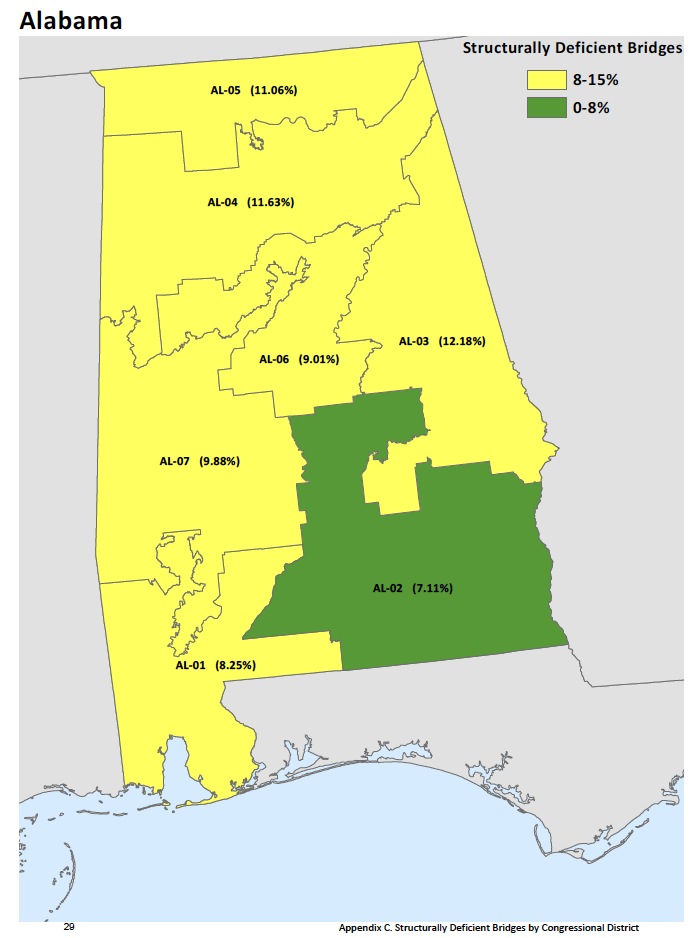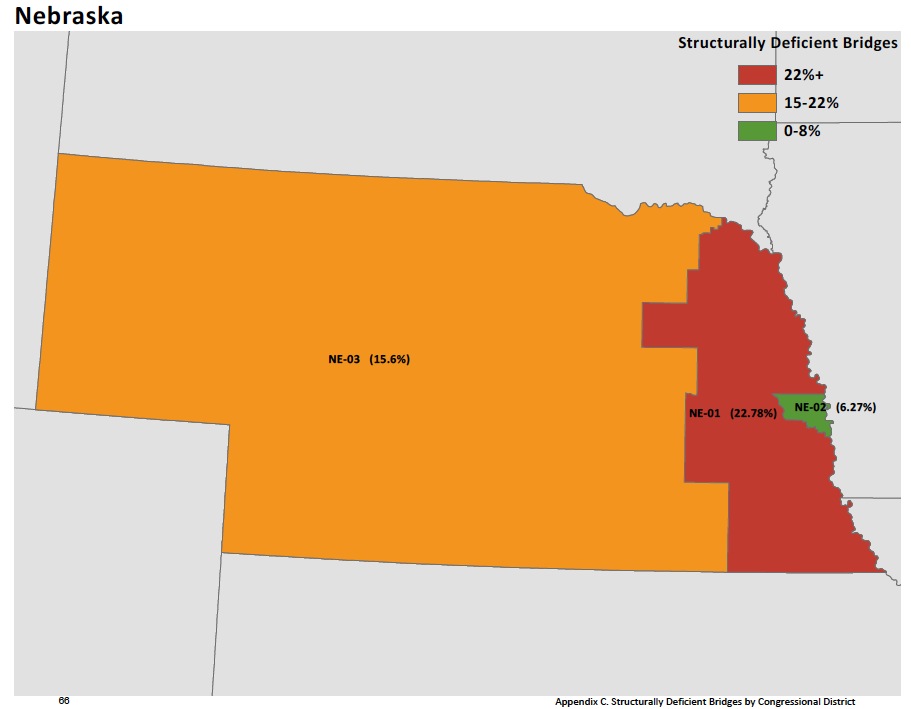TAXPAYERS FOR COMMON SENSE
Executive Summary
A large portion of the nation’s 600,000 bridges are in poor condition and require investment to repair or replace. Congress, by virtue of its control of spending and oversight, can encourage states to spend a greater share of transportation funding on maintaining and fixing existing infrastructure. If we are to reduce the number of deficient bridges in our transportation system – currently 11.5 percent of all bridges are deficient – Congress must be part of the solution.
Given Congress’ essential role, this report takes a first ever look at how Congressional districts fare when it comes to rates and numbers of deficient bridges.
Some of the results this report uncovers:
- The congressional district with the worst rate of deficient bridges is Rep. Nancy Pelosi’s (D) 8th district in California. Additionally, of 35 congressional districts with 20 percent or more bridges rated as deficient, 18 are in Pennsylvania and six in California.
- The district with the greatest number of deficient bridges is Rep. Frank Lucas’ (R-OK) 3rd Congressional District with 2,657, nearly 1,000 more than the next closest district. Additionally, there are eight districts with more than 1,000 deficient bridges.
- On a positive note, 92 districts have less than five percent of bridges rated as structurally deficient and 240 districts have less than 100 deficient bridges.
- The congressional districts with the highest rates of deficient bridges are evenly split between the parties. Of the 127 districts with above average rates of deficient bridges, 64 are represented by Republicans and 63 by Democrats (it’s a dead even 50-50 split when looking at the worst 100 districts).
- There is a greater partisan split in districts with the greatest numbers of deficient bridges; 74 are represented by Republicans and just 26 by Democrats.
- Five states provided bridge location data to Federal Highway Administration (FHWA) that is so unreliable that a breakdown by congressional district is impossible: Idaho, Kansas, Maryland, Ohio, and Wisconsin. Three additional states (and the District of Columbia) also had highly unreliable data, but these states have only one congressional district, so they were included in this analysis: North Dakota (which lacked geocoded data for an amazing 71 percent of its bridges), Alaska, and Montana, and D.C.
The report recommends the following:
- To ensure taxpayers are getting the greatest value for their investments, Congress should set performance targets to measure states’ progress in improving the condition of deficient bridges. This would be complemented by the FHWA developing standardized criteria across all states for bridge engineers to determine compliance and bridge conditions.
- Congress should eliminate or restrict the ability to transfer bridge repair funds to other projects until a state achieves a desirable level of good repair for its bridges; states should be required to dedicate a large portion of federal bridge funds to repairing existing bridges until a minimum threshold of overall bridge sufficiency is achieved.
- FHWA should ensure that all state spending on and investments in bridge repair is properly reported and cataloged so taxpayers and Congress can see exactly where Highway Bridge Program allocations are going. At present, when a project contains road and bridge improvements, it’s difficult or impossible to tell which portion of the spending was used to improve the condition of the nation’s bridges. This makes it difficult to ascertain how federal bridge funding is actually improving conditions on the ground.
- FHWA should standardize the review and reporting process to provide users better information about specific deficiencies on the nation’s bridges. In addition, states should be held accountable to provide better data to FHWA, including more accurate reporting about the location of bridges.
- Given the importance of the nation’s most heavily used bridges and the enormity of the negative consequences that would result if one of these bridges has to be closed, Congress should establish a standard that focuses resources on these immensely crucial facilities.
About Taxpayers for Common Sense
www.taxpayer.net
“Taxpayers for Common Sense is an independent and non-partisan voice for taxpayers working to increase transparency and expose and eliminate wasteful and corrupt subsidies, earmarks, and corporate welfare.”
Tags: Alabama, Bridges, Federal Highway Administration, FHWA, Nancy Pelosi, Nebraska, Taxpayers for Common Sense








 RSS Feed
RSS Feed